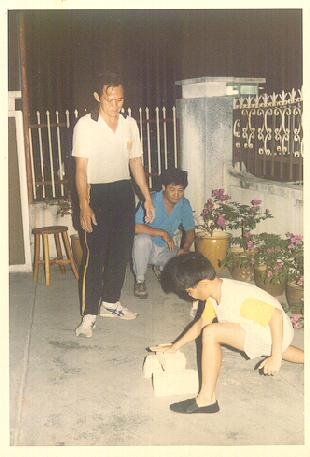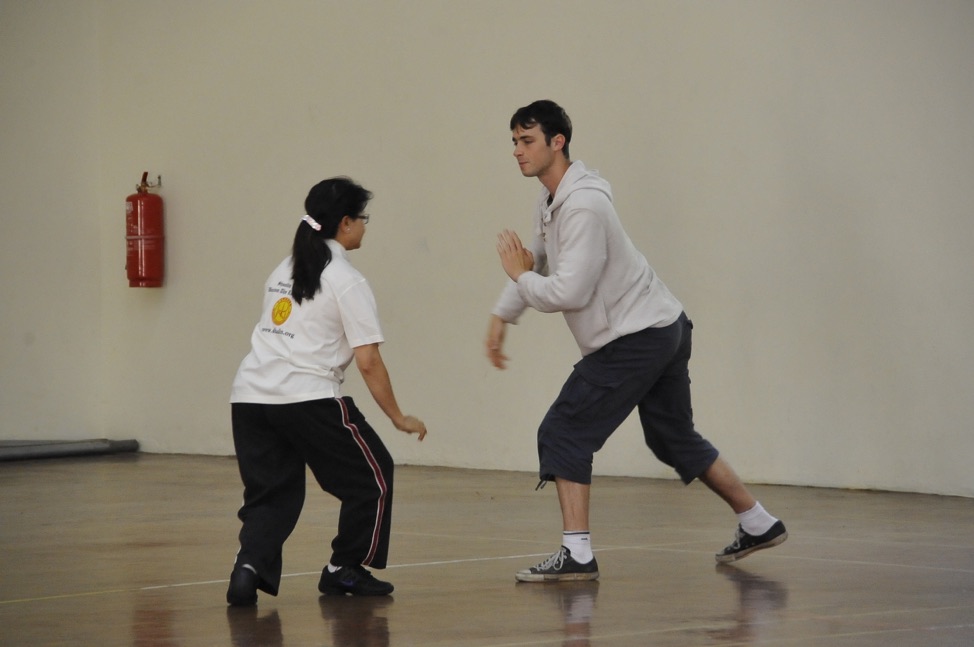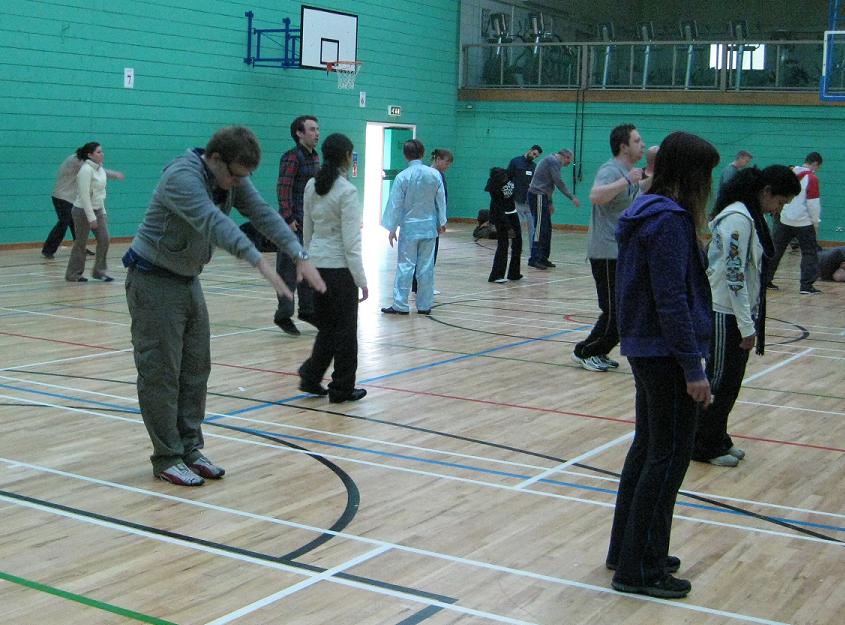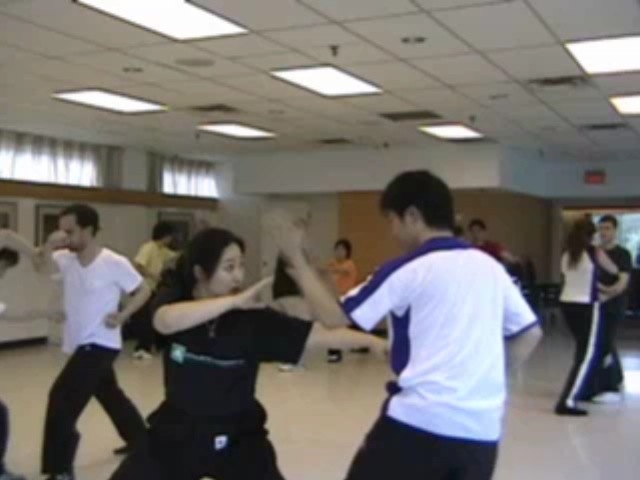SELECTION OF QUESTIONS AND ANSWERS
JANUARY 2017 PART 3

Sifu Wong Chun Nga breaking a brick with internal force almost 30 years ago when he was only 11 years old
Question 1
At the "Secrets of Internal Force" course at the UK Summer Camp, I took notes that only about 5% of Kung Fu practitioners today were able to develop internal force, while in the past about 70% could. In Shaolin Wahnam we are happy that 100% of our practitioners are able to do so.
— Sifu Leonard Lackinger, Austria
Answer
You are right that very, very few kungfu practitioners today, including masters, have internal force. Most other martial artists do not believe in internal force.
It is simply ridiculous that not only 100% of our practitioners have internal force, but also they make good use of it to enrich their life. This is something even masters in the past could not do. Many well known masters in the past, like the famous Taijiquan master, Yang Deng Fu, and the famous Xingyiquan master, Kuo Yun Sheng, led miserable lives.
I might have forgotten but I can't remember saying that 70% of kungfu practitioners in the past had internal force. If we take kungfu practitioners in the past in general, not just in the Shaolin Temples, I think less than 30% of them had internal force.
This 30% is a generous estimate. If we consider only kungfu students, leaving masters asides, I believe those with internal force would be less than 10%. Most kungfu styles were (and still are) considered "external".
Only those who practiced internal styles for a long time, like Taijiquan, Xingyiquan and Baguazhang, had internal force. On the other hand, external kungfu masters who had practiced their arts, like Hoong Ka, Wing Choon, Choy-Li-Fatt, Praying Mantisand Eagle Claw, for a long time might have internal force, usually without their own realization.
Question 2
My question refers to the "70%". Does this estimation refer to practitioners at the Shaolin Temples only?
Given that my interpretation of the 70% refers to practitioners at the Shaolin Temples is correct, what would be your estimation, in percentage, of successful internal force practitioners outside of the Shaolin temples in the past?
Answer
Yes, if I had said that 70% of kungfu practitioners in the past had internal force, I would be referring to practitioners at the Shaolin Temples only.
Even at the Shaolin Temples, Shaolin Kungfu was often referred to as external, different from the flowing force, for example, of practitioners practicing Taijiquan at the Chen Village. Even the Shaolin monks used "external" methods, like hitting sandbags and carrying water, when they had internal force.
Apart from the Shaolin Temples at Henan, Quanzhou and on the Nine-Lotus Mountain, my estimate of kungfu practitioners in the past with internal force is less than 30%. The situation today is worse. Less than 5% of kungfu practitioners now have internal force.

Shaolin Kungfu, usually considered external by most people, is practiced as an internal art in our school
Question 3
Also, from what I learned from you, I would say that even practitioners who had the rare chance of learning from an internal master would only be taught internal methods after showing their worth by years of external training first.
After learning the methods many still could not produce internal force consistently, because they did not know the secrets and underlying philosophy we have today.
I believe that internal training was always hard to find, be it today or in ancient China.
Answer
Both Northern and Southern Shaolin were (and still are) considered external. We are freaks to practice them as internal arts, which they really are, especially at an advanced level, though our students now could practice them as internal arts right at the beginning.
Indeed, internal training was, and is, very hard to find, today or in classical China. Your siheng, Kai, for example, spent a few years traveling to the East to seek for internal force, but to no avial.
My estimate of practitioners outside the Shaolin Temple in the past, and outside of Shaolin Wahnam now, who had or have internal force is less than 10% in general, which is a generous estimate. Base on my own experience, those with internal force is probably around 3%, and none of them know how to use it consciously to enrich their life. Because of their internal force, these rare masters may be more effective in their work, and more rewarding in their life, but they do not consciously apply it as we do.
We sound boastful, but we are merely stating the truth.
Question 4
Thoughts come to my mind all the time. How do I clear my mind of all thoughts?
— Alexei, Russia
Answer
Just do it.
In other words, if you want to clear your mind of all thoughts, just clear your mind of all thoughts, instead of thinking of how to clear your mind of all thoughts, or why or when or what is it to clear your mind of all thoughts.
The same method is applicable in daily life, which will make life more pleasant for you.
For example, if you want to find a new job, go for a holiday, or buy a present for your wife, just do it, i.e. find a new job, go for a holiday, or buy a present for your wife.
Instead of just doing what they want to do, many people intellectualize, and make themselves stressful. They intellectualise, for example, why they should find a new job, where they should go for a holiday, and how they should buy a present for their wife. They may intellectualize for a long time, but never get to do what they want to do.
In principle it is like standing up from the chair you are sitting on. Just do it. Just stand up. But instead of just doing it, i.e. just standing up, you start to intellectualize why you should stand up, how you can stand up, and whether you should stand up or remain sitting on the chair.

Students in our school are able to generate a chi flow on the very first day of their learning chi kung from us
Question 5
Why do many chi kung practitioners not have any chi flow despite practicing chi kung for many years, whereas we have a chi flow on the very first day we learn chi kung?
— June, Singapore
Answer
There are a few ways to answer this question, though all these different ways eventually refer to the same truth.
Many chi kung practitioners do not have any chi flow despite practicing chi kung for many years, whereas you have a chi flow on the very first day you learn chi kung because the many practitioners do not have the skills to generate a chi flow although they use correct or even the same techniques, but you can generate a chi flow on the very first day because you have the necessary skills.
Suppose a wealthy person gives a car to people who do not have the skills of driving. Although they may have the car for many years, they still cannot drive it. But if you have the skills of driving, you can drive the car on the very first day it is given to you.
Another way to answer the question is that many chi kung practitioners do not realise that they need special skills to generate a chi flow. They may not even know what a chi flow is. They think, wrongly, that if they perform chi kung techniques, they will have the benefits of chi kung. It is also not complimentary to them that they they do not realise this fact, that they do not get the benefits of practicing chi kung. Many chi kung practitioners are still weak and sick despite many years of practice.
On the other hand, you know the difference between skills and techniques, as this has been clearly explained to you. You also know that chi flow is the essence of chi kung, and that it is chi flow that gives the benefits of chi kung, not the chi kung techniques. In other words, even when practitioners practice chi kung techniques correctly, but do not experience any chi flow, they will not have chi kung benefits like overcoming pain and illness, and enjoying good health and vitality.
Most importantly, besides the important knowledge, you are transmitted the skills from heart to heart at the course so that you can use the skills to perform the techniques to generate a chi flow on the very first day you learn chi kung. Once the skills are transmitted to you, especially when you practice these skills during the course, they are yours, and you can use the skills to generate a chi flow when you perform chi kung techniques.
A third way to answer the question is that you entered into a chi kung state of mind, and performed chi kung in a chi kung state of mind. Hence, even on the very first day you learned chi kung, you could generate a chi flow. Other practitioners do not know how to enter into a chi kung state of mind, and do not perform their chi kung techniques in a chi kung state of mind. They may not even know what the term is. Hence, they may have practiced chi kung techniques for many years, but still are unable to generate a chi flow.
All these are different ways to answer the same question. Having the necessary chi kung skills, differentiating between techniques and skills, and entering into a chi kung state of mind, refer to the same situation -- the situation of generating a chi flow on the very first day you learn chi kung, or the situation of other practitioners not generating a chi flow despite having practicing chi kung for many years. Strictly speaking, these other practitioners do not practice chi kung; they merely perform chi kung forms, in the same way that many Taiji practitioners today do not practice Taijiquan, which is an internal, martial art; they merely perform external Taiji forms.
Although my explanation is clear, the uninitiated may not understand what I have explained although they may know the dictionary meaning of all the words used. They do not understand that it is necessary to have the right skills to generate a chi flow, that chi flow is the essence of chi kung, the difference between skills and techniques, and entering into a chi kung state of mind.
Despite my explanation, they still think that all they need to do is to practice chi kung techniques correctly and diligently, and eventually they will have the benefits of chi kung. Less than 20% of them if they practice for many years may eventually acquire the necessary skills and enjoy the benefits of chi kung, but usually they are unaware of the skills. The great majority merely practice chi kung forms.
Question 6
What can we do when we loose trust in someone or someone looses trust in us? Irrespective of who is wrong or has a wrong perception. I have had two occasions now where this is an issue for me.
— Binia, Switzerland
Answer
Different people may react differently when they loose trust in someone or when someone looses thrust in them. Many people will feel angry because they only see things their way, and presume the other party is wrong. The other party will also feel angry and presume these people are wrong.
If these people are weaker, in ability or status, they feel disappointed or dejected. Sometimes they rebel.
Often, both sides are right, but they see things from different perspective. The failure to understand and appreciate this fact leads to quarrels and fights, including amongst nations with much destruction.
We in Shaolin Wahnam see the issue the Shaolin Wahnam way. We realize that the same issue can be viewed from different perspective, and not that any side is right or wrong. We are able to differentiate opinions from facts, and realize that often opinions are more important.
Let us take an example. Suppose a student thinks Boxing is more effective for combat than Shaolin Kungfu, This is his opinion.
It is not a fact that Boxing is more effective in combat than Shaolin Kungfu, although in his particular case at this particular time, if he uses Boxing he is more effective in combat than if he uses Shaolin Kungfu. But the fact is different for me. I am more effective in combat when I use Shaolin Kungfu than when I use Boxing.
With this understanding, I shall explain to him that at present his Boxing is better than his Shaolin Kungfu because he has not practiced sufficiently to be skillful in Shaolin Kungfu. More importantly I shall explain to him the fact, not an opinion, that practicing Shaolin Kungfu the way we do in our school contributes to his good health, vitality, longevity and daily peak performance, whereas practicing Boxing would not. But if he persists in thinking that Boxing is better, I would not want to waste my time and would ask him to leave my class for his own benefit, and wish him well, as he does not have trust in my teaching.

Many kungfu practitioners find Boxing more effective for combat, but we in Shaolin Wahnam find kungfu more effective
Question 7
Trying to solve the problem with having a good conversation was somehow also no more possible. I tried to practice "forgiveness" as you suggested to me in another matter and indeed this helped me a lot beyond my imagination. But somehow here with forgiveness I don't seem to find the path. I would very much appreciate if you would share some of your wisdom with me.
Answer
Being able to forgive contribute to good health. The one who beneifts the most is the person who forgives, not the one forgiven. I have discovered from my many years of experience in healing that holding grudges insidiously leads to serious illness. Once a person can forgive, he (or she) lets go of the grudges, and allows chi flow to overcome the illness.
Forgiving and finding a solution to a problem are two different issues. Forgiving enables you to be calm and clear, and therefore you are in a better position to find a solution to your problem. But you still have to find a solution.
The Zen course you took some time ago gives you very useful tools to solve problems. Firstly, clear your mind of all thoughts. With mental clarity, you can effectively define your problem. Many people are constantly burdened with problems not because there are no solutions, but often without their own awareness, they do not know what their problems are.
Once, you have defined your problem, solutions often offer themselves readily. Choose the solution that is simple, direct and effective.
Question 8
How do I handle the problem of trust regarding my parents and myself?
Answer
Handling the problem of gaining trust in your parents having trust in you is quite different from the example I gave earlier though the main principles are the same. The main principles are to differentiate opinions from facts, and to realize that different people have different opinions.
There are two main differences. In the example, being his teacher I am in a superior position. Secondly I do not have to waste time on a student who has no trust in my teaching; I prefer teaching other deserving students.
In your case, your parents are in a superior position. Secondly, you have only one father and one mother. You need to have trust in them and have to win their trust in you.
Having trust in your parents is easy. Just realize that they protected you and brought you up from a time when you were totally helpless to now when you are independent. Now you may (or may not) be better educated than them and earn more money than they did, but this should not negate your trust in them.
Winning trust in ones parents is also not difficult, though many young people today lack this skill as well as are ignorant of some facts.
First the facts. It is a fact, not an opinion, that parents are superior in status to children. A person may become the president of a country, but his parents are still his parents.
It is also a fact that there is a generation gap which results in difference of opinions. Many parents, for example, are not in favour of sex before marriage, but many young people today think that sex before marriage is a norm. Please note that here having sex before marriage is a fact, considering it undesirable or normal is an opinion.
We should be grateful to our parents. This third point is actually an opinion, but it has become so established and has been taught by so many great teachers that it has been considered as a fact by many people. The Buddha, known for his immense wisdom irrespective of one's religion, has taught that even if a person carries his invalid father or mother on his shoulders everyday for 50 years of his life, and does this for 500 lifetimes, he still has not repaid the debt he owes to his parents.
Of course, another person may have a different opinion. He may think that it is stupid to respect ones parents. He may step on his parents or spit on them.
Irrespective of whether it is a fact or an opinion, it is good to respect ones parents, and evil to disrespect them. Good is whatever that brings benefit, and evil is whatever that brings harm. One who disrespect his parents will result in harm -- to himself, to his parents or to other people. Realizing this fact, i.e. it is good to respect one's parents, will make it easier to accept their different opinions.
But winning trust in ones parents is not just accepting their different opinions. More importantly, it is spending time with them and be kind to them. Parents actually do not care whether their children are wealthy or famous -- a misconception that many young people have -- but they do care that their children spend time with them and are kind to them.
If you have any questions, please e-mail them to Grandmaster Wong via his Secretary at secretary@shaolin.org stating your name, country and e-mail address.
LINKS
Selected Reading
- The Marvelous Benefits of Internal Force are for Everybody, not just Martial Artists
- Beautiful Trip from Finale Ligure to Zurich
- Seeing the World as I Never Could Belfore
- Wudang Cotton Palm
- The Heartland of South India
